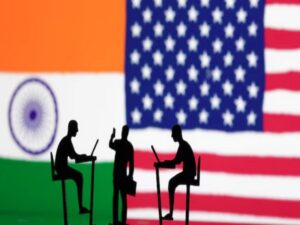Successful Indian startups migrating to Silicon Valley to have a pie of the American market: Rangaswami
Silicon Valley (US), Jun 6 (PTI) In a new trend, successful Indian startups have gradually started to move their base to Silicon Valley so that they can have a pie of the American market, an eminent Indian-American entrepreneur has said.
In the last few years, it is understood that three to four hundred highly successful Indian startups have moved to the US, according to Silicon Valley-based entrepreneur and philanthropist M R Rangaswami.
“This is a recent phenomenon, that’s happened in the past, three-four years when there is a lot of enterprise software as a service SaaS companies that were started in India, using Indian talent, Indian founders, but the customers happen to be in the US since US is the biggest IT market,” explained Rangaswami in an interview to PTI.
“So, after they create the product, they have to move to the US to be close to the customers. This has started a whole migration process of entrepreneurs moving to Silicon Valley. The estimates that I’ve heard in the past three-four years, a few hundred of these founders and CEOs have moved (to the US),” he said.
Indiaspora, founded by him, is looking into opportunities to mentor them.
“We are trying to see if these people need mentorship, can we mentor them? Can we advise them? Can we help them get funding? So, this is something that the Indiaspora group is figuring out at this point because a lot of our members here in the US are the leading VCs who have invested in these companies and these CEOs have come here.
“So, it’s in everyone’s best interests to really get this group to be successful. So this is a new phenomenon and that’s something we’re very involved with,” Rangaswami said.
Successful Indian startups, he said, are moving to the US because the Indian market itself is not sufficiently large for these companies to find enough big customers.
The US market is in the trillions, the Indian internal software market is in the USD 10-20 billion range, he noted.
“So, there’s not enough business to go around. Therefore, this is the market and that’s the reason it’s happening. But what we need is the Indian market now is growing. With the advent of cloud computing in India, a lot of Indian companies, and large companies are adopting cloud technologies, buying software as a service software and so forth. So it is growing and is growing fast, but it’s not big enough for companies to just stay in India,” he said.
When asked about the startup ecosystem in India, he said in the past three-four years, a lot of Indians who were living in the US and other countries, as well as, Indian venture capitalists and others invested heavily in India.
“When the Jio deal was done when Reliance got money from Facebook and other big companies outside of India. That was the seminal moment where investing in tech startups and tech companies in India started and grew over the past few years,” he said.
“It grew at a rapid rate to the creation of a hundred unicorns plus in India. But that period is over. Those unicorns now are having challenging times with the recession, with these unicorns being funded at very high valuations. So, the market in India is correcting right now with these unicorns where some of them will disappear, some will merge, and others will have a challenging time getting to the next level where they can either have an exit or go public,” Rangaswami said.
So, the investors in the US are monitoring the situation in India, and as a result, the flow of money into startups in India has slowed dramatically in the past 12 to 18 months, he explained.
Developing the startup ecosystem is a work in progress, the Indiaspora founder said, adding that it has submitted a set of recommendations to the Indian government.
“It’s getting better and better, but it’s not the same as a company being incorporated in the US and doing business in the US. There are still some vestiges of old rules and regulations that need to be changed in India. So it’s really, I would say it’s a work in progress, moving in the right direction,” he said.
According to Rangaswami, there are still some issues with the Angel Tax in India; issues dealing with incorporation and moving companies from India to the US require a lot of work; and companies coming back from the US to India require a lot of work.
“All those rules and regulations still need to be improved and changed to facilitate easy movement of money and companies between India and the US,” he said.
Observing that he is frequently asked if there will be a Google or Facebook coming out of India, he said that question is still to be unanswered.
“There are good companies coming out of India, but will there be a Google equivalent? Not so sure. At this point in time. I see a lot of deals in India. Some of them tend to be copycat deals. They look like a US company, but working in an Indian model. Some tend to be add-ons and functional improvements to the software. But in terms of breakthrough technologies, we have not seen too many companies in India come out with that type of product or solution at this point,” he said.
This is primarily because of a combination of the environment in India. “People come to Silicon Valley, we are sitting here in San Francisco, people come here because of the craziest of entrepreneurs. The venture investors here also invest in those crazy ideas. The US market lets those companies kind of unfold and work out. For example, here in San Francisco, we have driverless cars running around the entire city,” he said.
“That kind of stuff doesn’t happen everywhere? So, the environment is the biggest reason for, disruption in innovation. And that’s not the style of how it operates in India. That is an inhibitor. I’m not suggesting India become like the US, but in its own way, I think it’s improving and you’ll get its own kinds of innovation,” Rangaswami said.






